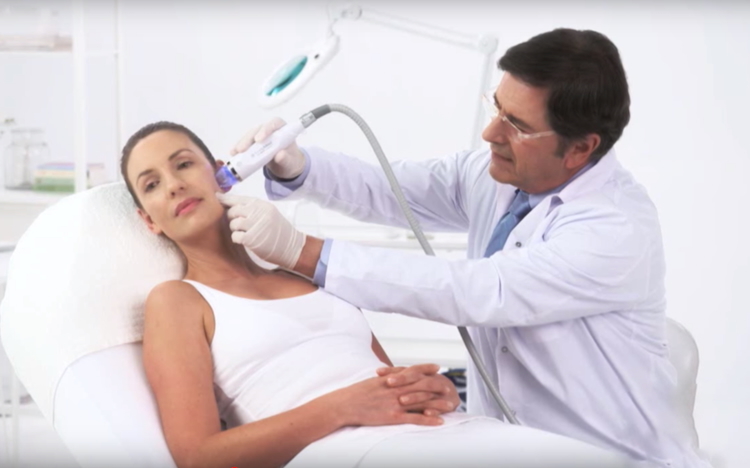Acne scar laser treatment - a dermatologist's guide
What is Acne Scar Laser Treatment?
Laser scar treatment, also known as laser resurfacing or laser therapy, is a highly effective method to treat acne scars and improve skin appearance. While topical products like MDacne’s Dark Spot Remover can help manage acne and fade pigmentation, deeper acne scar reduction often requires intensive procedures like laser therapy.
If you have active acne and scars, it’s essential to control acne with an effective treatment plan before starting cosmetic procedures. You can determine the right skincare routine by taking MDacne's free skin analysis.
Types of Acne Scar Lasers
Lasers emit concentrated light beams at specific wavelengths to target skin concerns. For acne scars, two main types of lasers are used:
- Ablative Lasers: These remove the outer layers of damaged skin to promote new skin growth. Examples include CO2 and Erbium YAG lasers.
- Non-Ablative Lasers: These heat the skin without removing its outer layer, stimulating collagen production in the deeper layers for smoother skin.
Fractional Lasers have become popular as they target smaller skin areas (300 microns each) for faster healing and fewer side effects compared to full-face laser resurfacing. They can either be ablative or non-ablative:
- Ablative Fractional Lasers (e.g., CO2, Erbium YAG): More potent with longer downtime but fewer treatments needed.
- Non-Ablative Fractional Lasers: Milder with minimal downtime but require multiple sessions for visible results.
How Does Laser Treatment Work?
During the procedure, a dermatologist uses a laser to target damaged skin cells, either removing the outer layer or heating the deeper skin layers to stimulate collagen production. This outpatient treatment usually lasts 20–30 minutes, often with a topical anesthetic to minimize discomfort.

Which Acne Scars Respond to Laser Treatment?
Laser treatments are most effective for:
- Depressed scars (rolling scars and boxcar scars). They are less effective for:
- Ice pick scars or hypertrophic scars (thickened scars or keloids).
For hypertrophic scars, Pulsed Dye Lasers (PDL) are often used to reduce redness and flatten the scar.
Side Effects and Downtime
Common side effects include redness, swelling, mild pain, and temporary oozing. These usually subside within a few days. Protecting the skin from sun exposure is critical during the healing process.
Can Lasers Treat Hyperpigmentation?
Lasers can effectively address hyperpigmentation, but it’s often treatable with less invasive options like MDacne’s Dark Spot Remover or dermatologist-recommended chemical peels, making them a more affordable and safer alternative.
Do Lasers Work on Darker Skin?
Fractional CO2 lasers may pose risks of discoloration for darker skin tones. However, milder Erbium lasers may be suitable for individuals with lighter-toned African American, Hispanic, or Asian skin. Alternatives like microneedle radiofrequency treatments are safer for all skin types and effectively treat scars with little risk of discoloration.
Costs of Laser Treatment
Laser acne scar treatments range from $300 to $2,000 per session, depending on the laser type, treatment area, and number of sessions needed. Most treatments require 3–5 sessions for optimal results, making it an investment to consider carefully.
Are There Better Alternatives to Laser Therapy?
Microneedle Radiofrequency (RF): A newer, highly effective option for treating acne scars. This method uses gold-plated microneedles to deliver radio waves into the skin at depths of up to 3.5 mm—five times deeper than fractional lasers. This stimulates collagen production without burning the skin’s surface, resulting in minimal downtime and excellent results.
Compared to lasers, microneedle RF is superior for deeper penetration, less discomfort, and faster recovery.
Acne Surgery (Subcision): For severe or pitted scars, surgical procedures like subcision, where a scalpel releases scar tissue under the skin, can provide dramatic results. However, this method is more invasive and expensive than lasers or microneedle RF.
Final Thoughts
Laser scar treatments are an effective way to reduce acne scars and improve skin texture, especially for depressed scars. Fractional lasers, whether ablative or non-ablative, offer significant improvement with varying downtime and cost. For individuals with darker skin tones or deeper scars, microneedle RF may provide safer and more effective results.
To decide the best treatment for your skin, consult a board-certified dermatologist to tailor a plan that suits your specific needs and skin type.
Shop
To find the right acne treatments for your unique skin, take the free skin assessment by clicking here.




